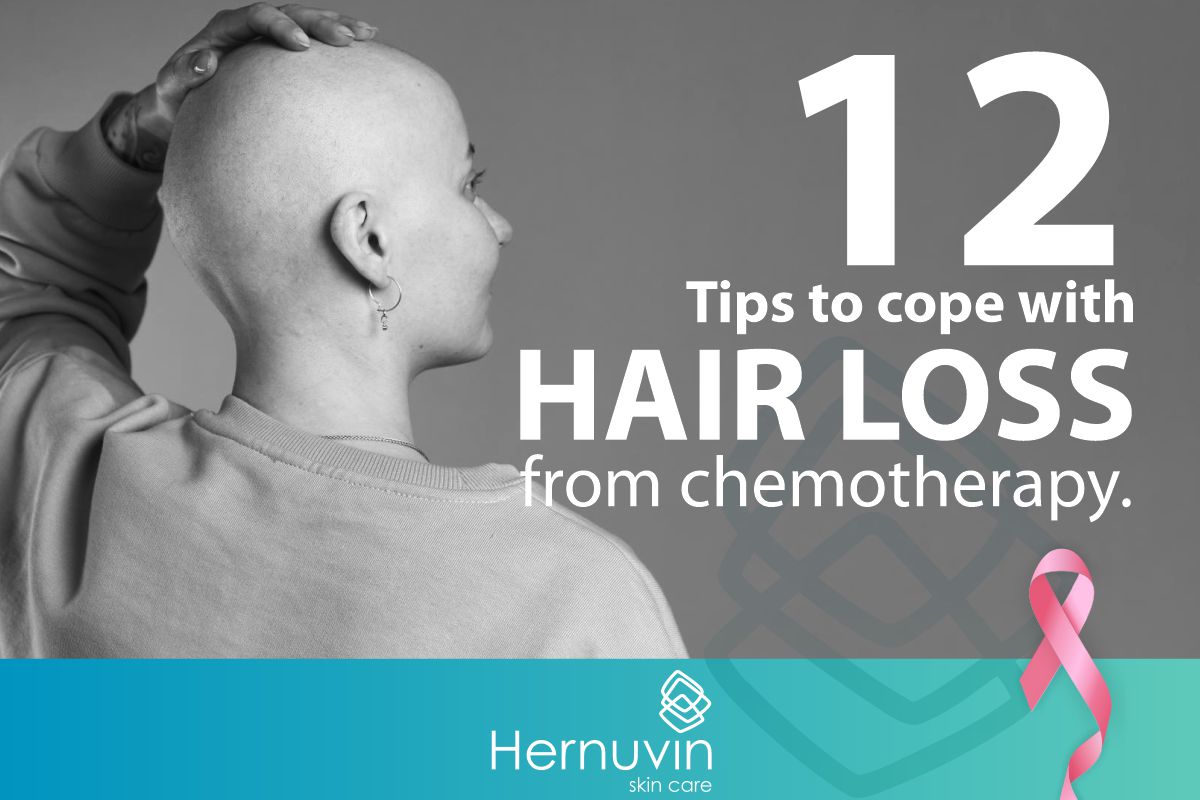Chemotherapy hair loss is temporary. We share 12 tips you can action while you wait for your hair to grow back.
Get informed.
If you have to undergo cancer treatment, make hair loss less scary by asking your doctor what exactly will happen. This will help to prepare yourself mentally for what might happen to your hair.
Prepare your family.
Depending on their age, children may be scared or even embarrassed by your hair loss. Let them know what to expect and why your treatment is so important. The more positive you can be, the better they’ll react.
Go easy on your hair.
To slow down hair loss, stay away from shampoos that contain strong fragrances, alcohol, or salicylic acid. For now, don’t color, perm, or chemically straighten your hair. Don’t use rollers, curling irons, or straightening irons. Use a soft-bristle hairbrush, and instead of using a blow-dryer, let your hair air-dry.
Try a shorter style.
Shorter hair doesn’t lie flat against your head, so it can make your hair look thicker and fuller. (It’s also easier to manage under wigs.) If you choose to shave your head, use an electric shaver or have it done at a barbershop. Plastic razors can cut your scalp.
Take care of your skin.
As you lose your hair, your scalp may get tender or itchy. Some people even feel a tingling sensation. A moisturising shampoo and conditioner can help, as will a gentle lotion that you can massage into your scalp. Hernuvin’s Scalp Serum has been designed to combat the effects of chemotherapy on the scalp. The benefits are as follows:
- Decreases follicle ageing
- Reduces follicle atrophy
- Increases microcirculation
- Strengthening the root matrix
- Offers anti-inflammatory benefits
- Desensitises the scalp
Rest easy.
Wearing a soft cap or turban around your head at night can help collect loose hair as it falls out. Don’t braid your hair or put it into a ponytail since both can tug on it. A silk pillowcase will also reduce friction when you’re asleep.
Cover up.
A scarf or hat when you go outside will shield you from the cold. If you choose not to wear one, don’t forget to apply sunscreen to your scalp to protect against sunburn.
Consider a wig or hairpiece.
If you decide to wear one, do your shopping at the beginning of your treatment so you can match the natural color, texture, and style of your hair. We recommend Gracies Wig Boutique. Their personal experience, expertise and passion creates an experience like no other for people suffering from hair loss as a result of cancer, alopecia and other related conditions. Visit http://www.gracies.co.za for more information.
Make the most out of your appearance.
Buy a new pair of earrings or a pretty, colourful scarf. Women may want to use makeup like an eyebrow pencil or fake eyelashes to play up other features. Hernuvin is able to offer advice in this area. Speak to us at https://www.hernuvin.com/contact/.
Ask your doctor about “scalp cooling.”
A tight cap filled with cold gel reduces hair loss for some people. The temperature narrows blood vessels underneath the scalp, limiting the amount of medicine that reaches hair follicles.
Talk about it.
It’s normal to feel anxious, depressed, or self-conscious about losing your hair. And women often have a harder time with it than men. A support group can connect you with others going through the same thing. They can share your feelings and offer advice. Visit CANSA for a list of support that you could benefit from.
Be patient.
Most people notice their hair growing back within a few weeks to a few months after they’ve finished chemotherapy. Many times, it’s a different color or texture, but this change is usually temporary.
Final Word
Here at Hernuvin, we have walked the journey with many cancer patients. The one take away we offer is, “Be kind to yourself and remember that your hair loss is temporary – your hair will grow back.”
You are welcome to talk to us about your hair loss and any skin care concerns you may experience from your cancer treatment.
Thank you for taking the time to read our article. Until next time, take care of yourself and your skin. You deserve it!
[su_divider width=”full”]
WHY HERNUVIN SKIN CARE
[su_quote]The Hernuvin range is all about trying to help people address a true need, a need that is not necessarily only cosmetic or aesthetic.” – Dr Hugo Nel[/su_quote]
Medically designed and scientifically formulated by a specialist plastic surgeon (whose anaesthetist is a breast cancer survivor), Hernuvin is specifically formulated to address the side effects of Chemotherapy and traumatised skin.
Whether your skin is normal, showing the signs of ageing or recovering from the effects of chemotherapy and estrogen depletion, the Hernuvin Skin Care Range offers a simple skin care regime that facilitates the restoration of ailing skin, as well as providing effective prevention and protective assistance for all skin types.
[su_button url=”https://www.hernuvin.com/shop/” background=”#66c3bb” icon=”icon: heart”]Find out more about our skin care range[/su_button]
[su_divider width=”full”]
Article References
https://www.webmd.com
American Cancer Society: “Hair Loss From Chemotherapy,” “Helping Children: When a Family Member Has Cancer: Dealing With Treatment.”
University of Iowa Healthcare: “Dealing with Cancer Therapy Hair Loss.”
National Cancer Institute: “Managing Chemotherapy Side Effects: Hair Loss,” “What to Do About Hair Loss.”
Memorial Sloan Kettering Cancer Center: “What Can I Do to Cope with Hair Loss Due to Cancer Treatment?”
Dana-Farber Cancer Institute: “Hair Loss During Cancer Treatment.”
Van den Hurk, C. Expert Review of Dermatology, 2011.

